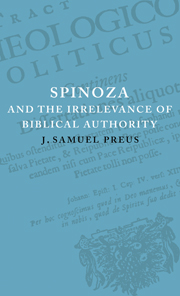Book contents
1 - Spinoza versus the interpreters
Published online by Cambridge University Press: 03 February 2010
Summary
…an act of communication always constitutes the taking up of some determinate position in relation to some pre-existing conversation or argument.
Quentin SkinnerTHE EXEGETICAL AND THE POLITICAL IN THE THEOLOGICAL–POLITICAL TREATISE
The fact that we are not governed by interpreters of divine law, nor intellectually answerable to alleged divine revelations, is a major aspect of modern liberty. For this we are hugely indebted to writers of the seventeenth century, above all to the Jewish philosopher Benedict Spinoza (1632–77). In formulating his definitive critique of theocratic government, Spinoza ventured beyond all earlier critics such as Machiavelli and Hobbes by attacking the very foundation on which all Protestant theocratic theory rested: the Bible itself and its interpreters. Because this achievement has not been sufficiently appreciated or analyzed, his Theological–Political Treatise (1670), recognized by some scholars as “a classic of modern democratic theory, ” has been unjustly neglected as a landmark in the history of western political thought whose originality and power comes fully to light only in view of its breakthrough in biblical interpretation.
A critical opening point is this: no theoretical contribution to the problem of political sovereignty could be made in Spinoza's era without dealing with the claims of religion as the foundation of political legitimacy and order. It is well recognized that Spinoza's thorough critique of scripture in the TTP was intended to undermine theocratic ambitions in the Dutch Republic.
- Type
- Chapter
- Information
- Spinoza and the Irrelevance of Biblical Authority , pp. 1 - 33Publisher: Cambridge University PressPrint publication year: 2001



